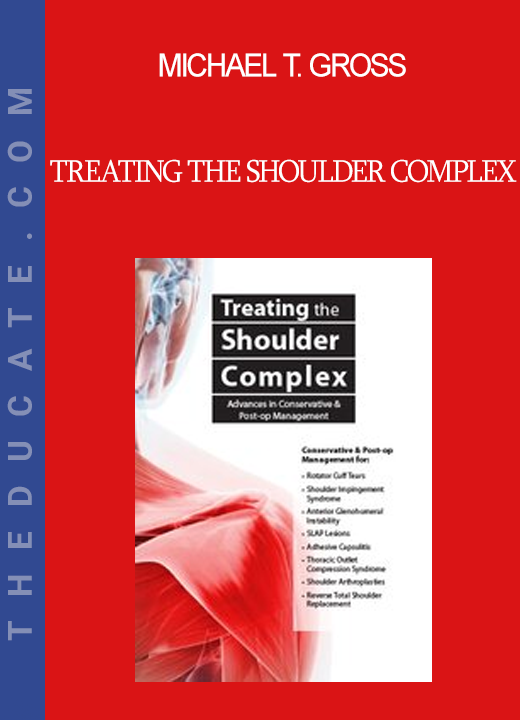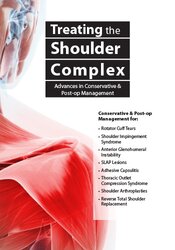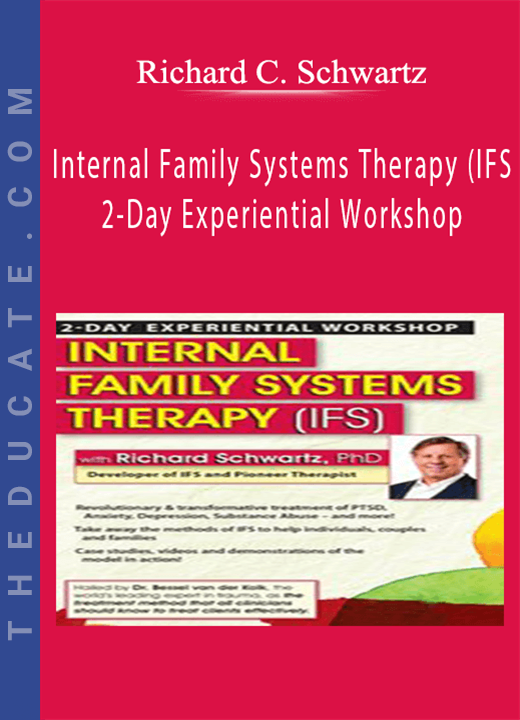Description
Michael T. Gross – Treating the Shoulder Complex: Advances in Conservative & Post-Op Management
- Faculty:
- Michael T. Gross
- Duration:
- 5 Hours 54 Minutes
- Format:
- Audio and Video
- Copyright:
- Jul 22, 2020
Description
Get the solutions for several shoulder complex pathologies in this insightful and important 6 hour seminar. Review and practice unique assessment tests to help you with early recognition of various pathologies. Improve treatment for your clients by examining the best evidence-based practices for conservative and post-op management, and by practicing glenohumeral and scapulothoracic mobilization techniques. Gain new tips and techniques you can implement tomorrow for:
- Rotator Cuff Tears
- SLAP Lesions
- Shoulder Arthroplasties
- Shoulder Impingement Syndrome
- Adhesive Capsulitis
- Anterior Glenohumeral Instability
- Thoracic Outlet Compression Syndrome
Handouts
| Manual – Treating the Shoulder Complex (11.38 MB) | 155 Pages | Available after Purchase |
Outline
ROTATOR CUFF TEARS
- Surgical restoration of normal and altered anatomy
- Cluster tests
- Modified empty can test
- Conservative management to prevent further injury
- Post-operative management
SHOULDER IMPINGEMENT SYNDROME
- Anatomic and functional contributors
- Cluster tests
- Hawkins-Kennedy; Neer’s test
- Conservative management based on etiologic factors
- Post-operative management
- Respect the deltoid as the worst offender
ANTERIOR GLENOHUMERAL INSTABILITY
- Anatomic restraints
- Etiologic factors
- Cluster tests
- Apprehension test
- Jobe relocation
- Release test
- Anterior drawer
- Push-pull
- Surgical procedures
- Bristow
- Latarjet
- Putti-Platt
- Rehabilitative management
SLAP LESIONS
- Classification of lesions
- Special tests
- Biceps load II
- Anterior slide tests for early detection
- Surgical management and rehabilitation based on lesion type
ADHESIVE CAPSULITIS
- Stages based on symptoms
- Etiologic factors
- Effects of conservative versus invasive intervention
- Conservative management based on stage of disorder
- Scauplo-thoracic mobilizations
- Anterior/Posterior/Inferior glenohumeral mobilizations
THORACIC OUTLET COMPRESSION SYNDROME
- Anatomic locations of potential compromise
- Etiologic factors in each anatomic location
- Intervention based on location of compromise and etiologic contributors
- Assessment tests
- Adson’s
- Military bracing
- Hyperabduction
- Surgical procedures
- Cervical rib excision
- Scalenectomy
SHOULDER ARTHROPLASTIES
- Rehab strategies for:
- Hemi-arthroplasty
- Total shoulder arthroplasty
- Reverse total shoulder arthroplasty
SPECIAL TESTS AND MOBILIZATIONS
- Hands-On Lab
- Interpret tests quickly to recognize problem
- Glenohumeral and scapulothoracic mobilizations
- Tips and new techniques
Faculty
Michael T. Gross, PH.D., PT, FAPTA Related seminars and products: 4
Michael T. Gross, PhD, PT, FAPTA, has 37 years of experience as a licensed physical therapist, specializing in the areas of biomechanics and orthopaedic assessment and treatment. He has maintained a consistent clinical practice for all of these years, currently seeing patients 2 days per week at his faculty practice.
He is a professor in the PhD Program in Human Movement Science, and the Doctorate of Physical Therapy (DPT) program in the Division of Physical Therapy at the University of North Carolina at Chapel Hill. Dr. Gross has 70 refereed journal publications in such journals as the Journal of Orthopaedic and Sports Physical Therapy, Physical Therapy, and the Journal of Manual and Manipulative Therapy. He was an Editorial Review Board Member for the Journal of Orthopaedic and Sports Physical Therapy and serves as a reviewer for many other journals. Dr. Gross was awarded the Teaching Excellence Award from the University of North Carolina at Chapel Hill School of Medicine and the Margaret L. Moore Award for Outstanding New Academic Faculty by the American Physical Therapy Association.
He also was elected as a Fellow of the American Physical Therapy Association. He has given well over 300 regional, national, and international presentations, which have been highly rated by attendees for knowledge, skill, and humor.
Speaker Disclosures:
Financial: Michael Gross is a Professor, Division of Physical Therapy, at the University of North Carolina – Chapel Hill. He receives a speaking honorarium from PESI, Inc.
Nonfinancial: Michael Gross has no relevant nonfinancial relationship to disclose.







Reviews
There are no reviews yet.